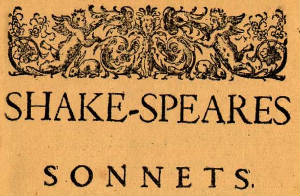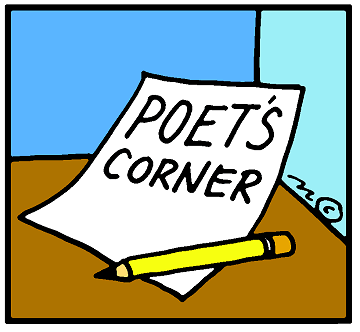|

TASK
ONE
1. Go to the link below.
2. Scroll down until you see the different genres of sonnets. Click on a few and find one that interests
you.
3. Print out the sonnet that you like.
4. Read the poem to yourself writing notes in the margins of what you think
the poem is conveying as well as circling metaphors.
5. Read the sonnet aloud. Does the meaning change? Remember, sonnets
were intended to be read aloud and not read to one's self. Write down how the meaning changed for you after reading it aloud
as opposed to reading the sonnet to yourself.
6. Continuing on your paper, write a two paragraph (at least 6-7
sentences per paragraph) reflection of what you think the poem is about and whether you like it or not and why.
7.
Turn in your poem with your comments and the reflection.
Sonnet Link:
http://www.sonnets.org/
TASK
TWO
Now, research the author whose
work you read in TASK ONE.
You will need to find:
1. Is
the author still living? If not, when did he/she live? If yes, how old is this author?
2. Where did/does this author live?
3.
Is there anything significant that has happened to this author in his/her life?
4. What kind of sonnets did this poet write.
For example, Shakespeare wrote many sonnets on the theme of love. Are your author's sonnets easy to understand or do they
take a lot of analysis? Explain.
5. Look at your summary from task one. Has your opinion changed of how you
like the poem now that you have found out more about the author? Why or why not?
TASK THREE
Write
your own sonnet! Remember the theme of this unit is nature, so you sonnet must be composed with this theme in mind. Have fun
with this and good luck!

TASK ONE
Research a poet who primarily
writes in free verse.
1. Go to the link below
2.
Go to Who's Writing it selection of website
3. Choose one of the links on this selection to research, Example,
click on Walt Whitman to find some of Walt Whitman's poetry (Walt Whitman wrote poems with the theme of nature.
He even has an entire book devoted to nature: Leaves of Grass).
4. Look at one of your author's poems.
Example, if you're at the Walt Whitman site, click on the poem Tests and the poem will present itself.
5. Print
out or write out the poem of your choice.
6. Read the poem writing
notes next to the lines.
7. On a separate piece of paper, write a summary of what you think the poem is about. Also, write
whether you like the poem or not and why.
Go to this link for FREE VERSE
http://www.poetry-portal.com/styles2.html
TASK TWO
Now, research the author whose work you read in TASK ONE.
You will need
to find:
1. Is the author still living? If not, when did he/she
live? If yes, how old is this author?
2. Where did/does this author live?
3. Is there anything significant that has
happened to this author in his/her life?
4. What kind of free-verse poetry did/does this author write? For example, do
they write long poems? short poems? poems that are written all over the page (e. e. cummings)?
5. Look at your summary
from task one, has your opinion changed of how you like the poem, now that you have found out more about the author? Why or
why not?
Write a summary for TASK TWO including all of the questions asked above.
TASK
THREE
Write your own free verse poem. Remember, this unit addresses the theme of nature, so be sure to include
an aspect of nature in your free verse poem! Note! Did you know that many songs are written in free verse? For task three,
you have the option of writing a song instead of a poem.

Many metaphysical poems that you will find will have to do with love. If you choose to
do your webquest on metaphysical poetry, keep in mind that love can be considered part of nature, so you could write a poem
about love in the metaphysical form.
John Donne and Andrew Marvell were accomplished metaphysical poets of the 17th century.
TASK
ONE
1. Go to the link below to find a Metaphysical poet.
2. Choose a poet from the list
3. Print out one
of his works to analyze
4. Analyze the poem. What metaphors does this poet use? What message is this poet trying to convey
through these metaphors?
5. Write a summary of what you think the poem is about according to the metaphors and how it connects
to you. Do you like the poem? Why or why not?
TASK
TWO
For task two, you will be doing a search of your author. You may continue using the link that you used in
Task One. You must write a summary of:
1. When did your poet live?
2. Where did he live?
3. What was something significant about his life?
4. How long was he a writer?
5. Do you like
his poetry more/less now that you know about the poet? Why or why not?
TASK
THREE
Write your own Metaphysical Poem. Our unit is on nature, you should include nature as an aspect of your
poem, however, love is an established theme for metaphysical poems, so you may choose love as your theme.
Still not sure what a metaphysical poet is? Click here.
Find a metaphysical poet here
|

